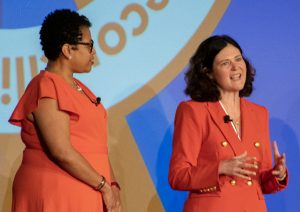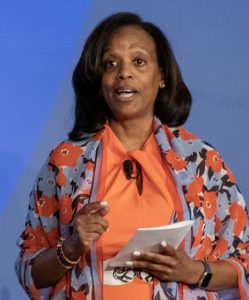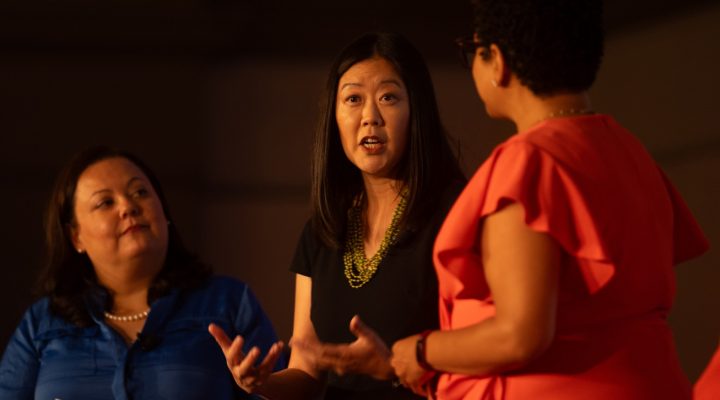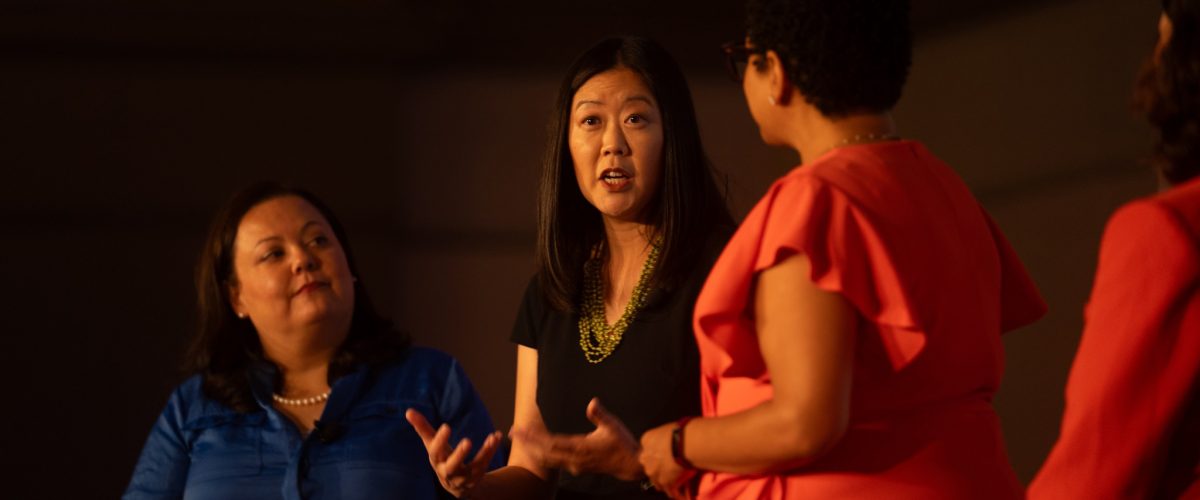Those dedicated to religious freedom should remember that serving the needs of immigrants is part of that struggle, Anyra Cano said during a June luncheon hosted by Baptist Joint Committee for Religious Liberty.
This reminder is a critical given that Florida and other states are aggressively targeting immigrants and the people and institutions that serve them, said Cano, vice chair of the BJC board of directors and head of programs and outreach for Fellowship Southwest.
“We have learned a lot about anti-immigration laws and bills that are coming closer and closer to criminalizing, auditing and obligating faith groups and faith-based organizations to consider how they are going to respond to the tired, to the poor, to the huddled masses journeying to breathe free when they come to their doors. Churches — my church, your church — should not have to think about who you can serve or how you can serve based on immigration statuses.”
“Churches — my church, your church — should not have to think about who you can serve or how you can serve based on immigration statuses.”
Cano was one of several BJC board and staff members to introduce the committee’s new Center for Faith, Justice and Reconciliation during the luncheon at the Cooperative Baptist Fellowship’s 2023 General Assembly in Atlanta.
The center was created with assets from the 2019 closure of Baptist Theological Seminary at Richmond and acquired by BJC earlier this year.
In a 22-minute video clip from the luncheon released July 19, each speaker briefly described the diversity of issues, including race and gender, that will be tackled by the center.
Cano zeroed in on the injustice of a new Florida law — supported by Gov. Ron DeSantis — criminalizing those who provide transportation to undocumented immigrants. That would include congregations that take migrants to church or social services.
“As I considered this question, I kept getting pushed and pulled toward Matthew 25,” she said. “I’m a pastor, so I apologize. I have to go to Scripture.”
But Cano paraphrased the words of the well-known passage to address the hostility toward immigrants in the U.S. “I was hungry, but you were obligated to ask if I was illegal. I was thirsty, but you might get audited. I was sick, but you had to report my status. I needed clothing, but I wasn’t the right color immigrant. I was in prison, and you could not visit me. I was a stranger, but you were afraid of being criminalized as a smuggler.”
“I was a stranger, but you were afraid of being criminalized as a smuggler.”
Churches should not have to fear the imprisonment of members or volunteers for transporting migrants to worship or needed services, Cano said. “I hope you thought to yourself, that is not my Jesus. I hope you know that that’s not what Scripture says.”
Nor does the Bible endorse churches and ministries being forced by the state to act as immigration officers, she said. “Churches — you and I — we are to be beacons of hope, of safety, of refuge, and we are called by Christ to be his servants, not servants of a government who may call on us to stop, to seize, to limit, or make us turn away those whom God has called us to love and to welcome.”
It’s also important to consider the anxiety these laws create in those desperate for spiritual refuge, she said. “Immigrants should not have to fear to seek a faith group, a faith community or faith-based social services just because they are immigrants or because they’re afraid of being policed by churches and by governments.”

Sabrina Dent (left) amd Amanda Tyler
The quest for religious freedom cannot be divorced from the race, justice and the geopolitical realities facing the nation, BJC Chief of Staff Janna Louie added.
And the work of justice must include giving voice to the marginalized, she said. “The gifts of humility and listening come when we’re able to take the leadership and the initiative of people who don’t have formal power.”
As a daughter of immigrants, Louie said she did not enjoy learning history growing up because her community’s stories never were told in that context.
“My journey in valuing religious freedom and justice actually began when I lived and learned from communities all across Southeast Asia who are not afforded the same freedoms we have in the struggle for justice,” she declared. “So, my hope in expanding our work in religious freedom through a justice lens would actually first come by assuming a posture of humility and listening.”

Lynn Brinkley
BJC board Chair Lynn Brinkley highlighted the value the center represents in connecting women in ministry as a form of religious freedom.
“As a Baptist woman in ministry, I know we’ve got some difficult days ahead. If we’re going to see religious freedom through a more justice lens, we have to see that there are individuals who are using the Bible to limit the power, the pulpit presence and the pastoral calling of women.”
Supporting women in ministry requires determination and cooperation, Brinkley said. “What is needed for us to make the world a better place, more just for women in ministry, is that we need collaboration. We need organizations like Baptist Joint Committee, Baptist Women and Ministry and the Cooperative Baptist Fellowship, the Center for Faith, Justice and Reconciliation.”
BJC Executive Director Amanda Tyler said the center will help widen the dialogue around religious freedom and will host the committee’s Race and Religious Freedom initiative.
“We at BJC today are the modern-day heirs of the founders of the Baptist movement who were willing to give their lives to advocating for the freedom of others, who understood that our freedoms are all interdependent and intertwined and that our love of neighbor requires our solidarity with everyone whose freedom is threatened,” Tyler said. “And so, if we are going to live into this calling, we must listen to those whose freedom is most impacted and threatened today and learn to advocate in community with them. And the center will help us do that.”
Related articles:
Religious freedom has been ‘white too long,’ BJC speakers declare
Advocacy’s power flows from grassroots movements, Tyler and Henderson tell CBF
BJC acquires Center for Faith, Justice and Reconciliation


